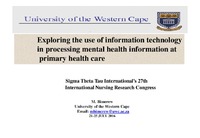| dc.description.abstract | <p>Session presented on Monday, July 25, 2016:</p>
<p><strong>Background:</strong> In the contemporary world, the qualities of healthcare provisions are advanced with the use of information technology (Cline, & Luiz, 2013). Evidence has shown that the use of information technology in health information processing have considerable potential for reducing inappropriate clinical practices and promote accessibility of information to the public health workers (Ranck, 2011; Reeder, Turner & Demiris, 2010). Furthermore, the use of information technology in health information processing offers healthcare provider an exceptional opportunity to improve standard of patient care, not only by accessing and exchanging relevant information on individual patients, but also access to immediate pertinent and up-to-date information for decision-making process (Black, Car, Prylari, Cresswell, et al., 2011). Health information processing includes capturing patient information or data, collating, analysing, reporting and utilizing. Mental healthcare in particular moved away from institutional care and integrated into the primary health care model of service delivery, which involves a range of services. Against this background, where different aspects of mental health care are delivered from different aspects, the need for the use of technology in processing quality patient information is crucial for patient to receive quality care (Eldessouki & Smith 2012). Although, there is District Health Information System in South Africa since 1999, little is known about the use of information technology in processing mental health information at primary health care.</p>
<p><strong>Purpose:</strong> The purpose of the study was to explore the use of information technology in processing mental health information at primary health care services. Objectives: To explore and describe how information technology is being used to process mental health information at the integrated primary health care service To explore and describe the barriers in the use of information technology in processing mental health information at the integrated primary health care services.</p>
<p><strong>Methods:</strong> The study employed qualitative approach using semi-structured interviews. A purposive sampling technique was used to select participants for interviews. Data was collected from a total sample of (N=51) participants and interviews were recorded using audiotape recording with permission from the participants. Data was analysed using thematic content analysis.</p>
<p><strong>Results:</strong> themes emerged were, paper-based recording and reporting, information recording and processing was fragmented, inaccurate and inconsistent recording of patient information. Major barriers to information processing include lack of standard information collection tool and indicators for mental health, unavailability of information infrastructure, information networking and feedback system, lack of knowledge & skills to record and process quality mental health information, and lack of information culture. The interpretation of the results highlighted that the current mental health information recording and processing were limited to collecting and reporting the head count, which was inadequate for sound decision making process or planning mental health care services. Reporting head count doesn't give the true picture of mental health problems, such as socio-demographic information, diseases profile and the types of population affected. There were inaccuracies and inconsistencies in recording and processing the information. There were no standardised information collection tools and mental health indicators. Information collection tools used in the primary health care facilities change frequently and that created confusion to the information collectors. The information auditing system was done by the health facility managers superficially on monthly basis before the information send to the substructure office. The inconsistencies of the reported information checked by the substructure information officer using the computer. For accuracies of information, the facility manager relies on the work of information officer who have no training on information system. The unavailability of information infrastructure, such as skilled personnel, computer, software, network, standard information collection tools and validation, and feedback systems affected the quality of information processing made it difficult to improve the mental health information system. The Knowledge and skills frequently compounded by negative attitudes towards collecting and processing information, as this been considered an add up job to the health care providers.</p>
<p><strong>Conclusion:</strong> The uses of technology for mental health information processing were poor at primary health care services in the Western Cape. Although paper-based information is processed, it is fragmented, not reliable and inadequate for decision making process. The lack of information infrastructure is the major barriers in processing quality mental health information. These have affected planning efficient mental health services and outcomes. The use of information technology could facilitate organized and timeously activities and improve quality patient care. Therefore, investing on the development of information infrastructure is crucial as well as capacity building, such as training and educations that allow healthcare providers to fully appreciate the benefit of quality information processing for patients care.</p> | en |





